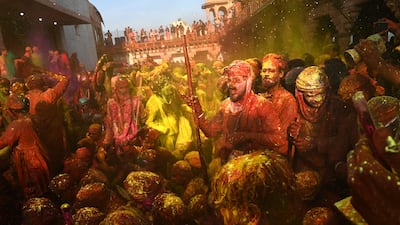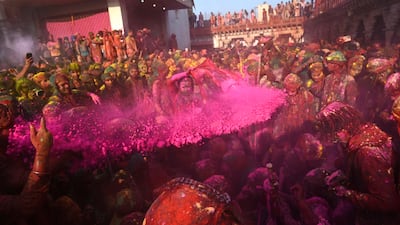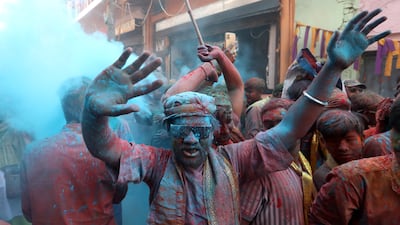Holi, the Hindu festival of colour, is celebrated around the world, marked by raucous parties where people throw and smear coloured powder on each other.
The festival, the celebrations for which begin on March 14 in many parts of India, signifies the arrival of spring and, for many Hindus, the triumph of good over evil.
Held in March on the full moon night known as Phalgun Purnima in the Hindu calendar, the date changes slightly every year.
While the first night is usually dedicated to more sombre rituals, it is on the second day that the vibrant celebrations begin. Across India and Nepal, for instance, streets will be filled with colours as powdered dyes are thrown by people at each other and coloured water is sprayed for raucous fun.
Revellers are often advised to moisturise their hair and skin well, to stop the dye staining them, and clothes do not usually survive the day.
The celebrations are deeply rooted in tradition and have been observed for hundreds of years.
Where did Holi begin?

There are varying accounts of the festival’s origins but it has been celebrated on the Indian subcontinent for centuries, as documented in ancient Indian literature.
According to Indian historian Sushma Jansari, a faculty member at the British Museum, there are three main myths associated with Holi. One of the most popular stories concerns the Hindu deity Vishnu and his devotee Prahlada, she writes on the museum's blog.
According to one version of this story, Prahlada was the son of an evil king named Hiranyakashipu, who demanded that everyone should worship only him. Prahlada refused to worship his father and instead continued to pray to Vishnu. Holika, Hiranyakashipu’s sister, grew angry at Prahlada because of his devotion to Vishnu and decided to kill him. She had been previously blessed by the gods so that she would not be harmed by fire, so she tricked Prahlada into sitting on her lap while she sat in a fire.
Prahlada survived this ordeal because he prayed to Vishnu, while Holika perished. Holi, the name of the festival, is thus derived from the name Holika.
In different parts of India and Nepal, bonfires are lit on the first night of the festival to signify the demise of evil.
Another story is linked to the god Krishna’s love for Radha, Jansari writes. Krishna’s skin was dark blue because a demoness had tried to poison him when he was a baby, and Krishna was worried that Radha would not like him because of his appearance.
His mother, Yashoda, playfully suggested that he smear some brightly coloured powder on Radha’s face. After Krishna did this, Radha fell in love with him and they were later married.
Some people also believe the Holi colours came from Krishna mischievously throwing coloured water on his subjects, which became part of the celebrations.
How is it celebrated?
In different parts of India, where it is a national holiday, Holi is adapted to various cultures. In the state of Uttar Pradesh, for instance, women playfully hurl sticks at men, who use shields to protect themselves.
In parts of Punjab, Holi fairs are held and can go on for days, while in the north-eastern state of Manipur, young people perform a group folk dance called thabal chongba on full moon night, and celebrations usually last for six days. The fun and games with colours, however, take place everywhere.
Holi is also a big festival in Nepal, where it is a national holiday.

Holi in the UAE
Holi celebrations have gone truly global, thanks to the Indian diaspora. Colour marathons, where participants are doused with coloured powders, have become popular around the world. Some critics, however, say these events destroy the religious significance of the festival.
In the UAE, for example, the festival is usually marked by concerts and outdoor parties. This year, however, as Holi falls during Ramadan, many celebrations were held earlier in the month. Restaurants are also cashing in on festivities, launching special Holi menus and deals.
Here are some to try.
Bombay Brasserie

The Indian restaurant at Taj Dubai is serving a curated menu featuring vegetarian and non-vegetarian options. It includes samosa rose dahi bhalla, pani puri and sev papdi chaat as well as an assortment of traditional home-made sweets and festive mocktails.
A live sitar player will serenade guests as they tuck in and all guests will walk away with commemorative takeaway gifts.
March 14, from 6pm until midnight; Dh249 per person; Taj Dubai, Business Bay; 04 438 3222
Dhaba Lane

Known for its Punjabi food, Dhaba Lane is offering a shot of thandai, a cold drink prepared with exotic nuts and spices, and three gujiyas, or sweet pastries, for Dh20. Both commonly associated with Holi, the milk-based thandai is flavoured with rose petals, dry fruits and spices, while gujiyas are shaped like dumplings and made of flour and stuffed with roasted dried fruits, grated coconut and semolina.
March 10 to 14, all day; Dhaba Lane branches in Karama, Garhoud, JLT and Al Nahda; 04 358 3554
Chatori Gali
This home-grown vegetarian restaurant known for serving North Indian cuisine is splashing flavour and colour for Holi. All visitors will receive complimentary thandai shots as a welcome drink, with the special menu featuring festive treats and desserts, from jalebi to rabri and gujiyas. Guests who order from the Holi menu will also receive a free kebab platter.
March 14, 9am until midnight; Chatori Gali's Dubai branches in Al Barsha, Silicon Oasis and Karama; 054 582 6378
The Permit Room
Serving food from across the Indian subcontinent, all visitors to The Permit Room during Holi will receive a free thandai and two gujiyas. All guests will be greeted with splashes of colour, the hallmark of Holi, as they dig into the restaurant's offerings, from burrata chaat to truffle Amritsari kulcha and mushroom achaar.
March 14 to 16, all day; Majestic City Retreat, Dubai; 054 791 1796
The Cinnamon Club
A thali menu awaits diners at this restaurant in Park Hyatt Dubai, offering vegetarian and non-vegetarian options. Dishes include Jodhpuri kachori chaat, tandoori prawn, Rajasthani lamb curry and chicken biryani, all served alongside creamy dal makhani, bhurani raita and a selection of Indian breads.
March 14 to 16, all day; Dh150 for vegetarian and Dh175 for non-vegetarian thali; Park Hyatt Dubai; 04 602 1814
Punjab Grill

The fine-dining restaurant specialising in north Indian cuisine has launched a Holi menu at its branches in Anantara Downtown Dubai and The Ritz-Carlton Abu Dhabi. Expect all the festive favourites but in an elevated setting, from chaat platters to Kundapur ghee roast shrimps. For desserts, tradition gets a modern twist with dishes such as thandai panna cotta with berries and malpua with rabdi.
March 14 to 16, all day; Anantara Downtown Dubai and The Ritz-Carlton Abu Dhabi; 50 194 1107
Amiana
All guests dining at this Indian restaurant in Karama will receive a complimentary glass of thandai as well as a buy-one-get-one-free on firna, the traditional dessert made with ground rice or rice flour and cooked in milk.
March 14, all day; Zabeel Street, Karama, Dubai; 04 297 6449
Emirates

All passengers travelling on board Dubai's airline to and from seven destinations in India – Ahmedabad, Bengaluru, Chennai, Delhi, Hyderabad, Kolkata and Mumbai – will receive gujiyas in a specially designed box, along with their meal for breakfast, lunch or dinner. First and Business Class customers will also be served thandai on the day. Emirates serves nine destinations in India with 167 weekly flights.
March 14, all day; Emirates; 600 555555










